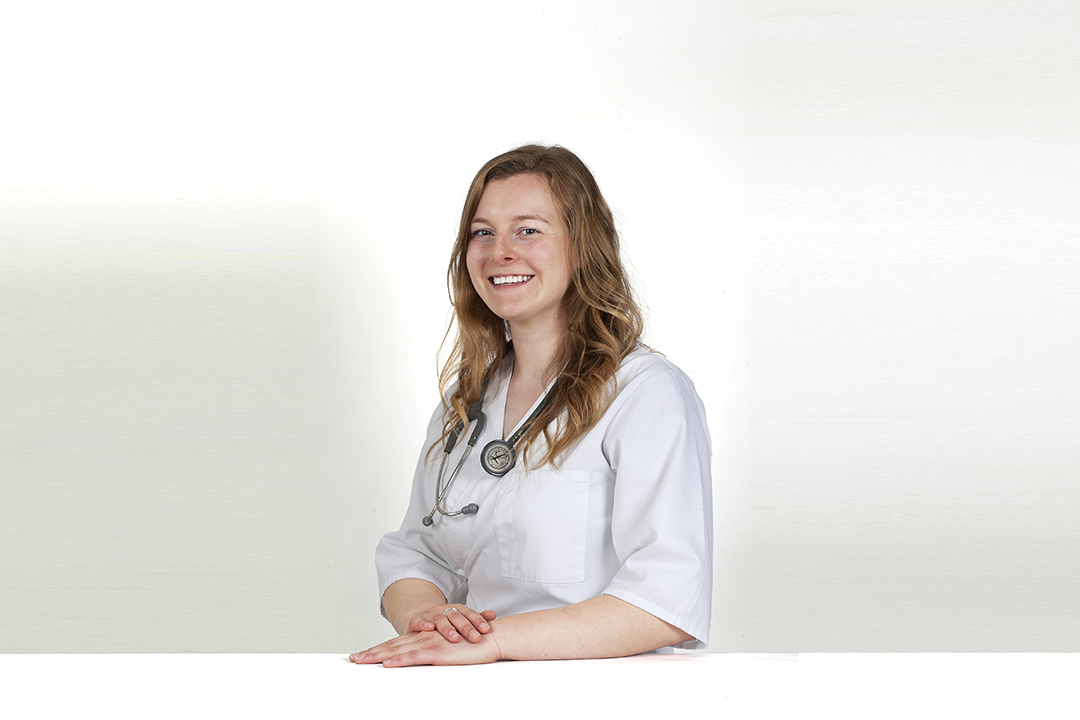
A love for nature led student to veterinary medicine
Madison Logan grew up surrounded by the beauty of Yukon and spent hours with her family enjoying outdoor activities such as snowshoeing, kayaking and playing in glacier-fed lakes.
By Lynne GunvilleThose childhood experiences inspired her love for nature and wildlife – and that enthusiasm for the natural world prompted her to pursue a career in veterinary medicine.
“Wildlife medicine is what first drew me to veterinary medicine,” says Logan, a first-year student at the Western College of Veterinary Medicine (WCVM). “I felt that by becoming a veterinarian, I could pursue my passion for health science as well as environmental science by studying wildlife health and diseases.”
Logan’s interest in environmental science and stewardship began in high school when she participated in an experiential science and outdoor education program. She learned how to sea kayak, rock climb, scuba dive and surf, and she acquired valuable outdoor survival skills while camping throughout Yukon, Alaska and British Columbia.
In addition to her outdoor interests, Logan played a variety of high school sports and activities. She played competitive hockey for the Yukon Female Mustangs, and she was selected to play at the Canada Winter Games 2011 as well as two Arctic Winter Games.
“Hockey taught me about hard work and dedication,” says Logan. “While training for Canada Winter Games, our team carried the mantra, ‘You get out what you put in,’ which is applicable to training, school and anything in life that requires dedication.”
Logan’s love for nature made her a perfect candidate for summer jobs with Yukon’s Department of Environment, and over four years she had a variety of roles that included data collection in wildlife territory as well as running multi-day canoe trips for children.
When one of those jobs involved observing and working with the staff and veterinarians in the department’s Animal Health Unit, Logan’s eyes were opened to the variety of career paths that would be available to her in the veterinary profession.
Once Logan decided that veterinary medicine was the career for her, she began working toward that goal by enrolling in classes at Yukon College and then the University of Saskatchewan. She also focused on securing volunteer and work experiences that would provide her with various skills related to animals and veterinary medicine.
Many of Logan’s favorite volunteer experiences came from her work milking cows and feeding calves at the U of S Rayner Dairy Teaching Facility.
“It’s rare to see a cow in the Yukon, so working at the dairy barn surrounded by 100 cows was a completely new experience for me,” Logan recalls. “Working at the dairy barn opened my eyes to other areas of veterinary medicine that I’d never been exposed to.”
She also enjoyed her summer job at Yukon Wildlife Preserve – a chance to work with over 180 animals belonging to 12 northern species. Caring for the rehabilitation animals was a particular highlight that reinforced her goal of becoming a veterinarian.
“Over the summer a multitude of wild animals were brought in, from baby robins and flying squirrels to great horned owls,” says Logan. “It was rewarding to see the animals being released back into the wild after we’d spent hours caring for them. It reminded me why I wanted to pursue veterinary medicine in the first place.”
Now that Logan is at the WCVM, she’ll have the opportunity to build on all of those past experiences.
Logan points out that every one of those experiences has shaped her knowledge, skills and understanding of herself and veterinary medicine. But while she appreciates looking back, she’s also looking forward to her life after graduation.
“I’ve always wanted to travel to Africa and South America. After I graduate, I’d like to apply my veterinary skills and work abroad with wildlife for a couple of years. Then I plan to return home to the Yukon to practise either with small animals or with wildlife – maybe even with a mobile clinic that caters to Yukon communities and farms.”
